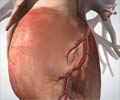Aspirin may reduce the risk of death in postmenopausal women who have heart disease or who have had a stroke, according to a new study.
Aspirin may reduce the risk of death in postmenopausal women who have heart disease or who have had a stroke, according to a new study.
The Women's Health Initiative (WHI) Observational Study also provides new insight into aspirin dosing for women, suggesting that a lower dose of aspirin (81 milligrams, or mg) is as effective as a higher dose (325 mg).This is good news for women who might be concerned with internal bleeding, a well-known risk of aspirin that may be more likely with higher doses of aspirin, according to other studies. However, randomized clinical trials are needed to determine the optimal doses of aspirin in women with cardiovascular disease.
Scientific evidence indicates that, in general, aspirin lowers the risk of death and incidence of heart attack and stroke in patients with a history of cardiovascular disease; however, the benefits of aspirin in women with stable cardiovascular disease in particular are unknown.
In this study, researchers analyzed data from 8,928 postmenopausal women who had previously had a heart attack, stroke or transient ischemic attack (TIA, or mini-stroke), angina, or angioplasty or coronary bypass surgery to improve blood flow. Participants were followed for an average of 6.5 years.
The researchers found that as compared to those who did not report taking aspirin, regular aspirin users had a 25 percent lower risk of death from cardiovascular disease and a 14 percent lower risk of death from any cause.
They found that overall, aspirin use did not significantly decrease the risk of heart attack, stroke, or other cardiovascular events, except among women in their seventies.
Advertisement
The study appears in the March issue of the journal Circulation: Cardiovascular Quality and Outcomes and was published online March 5, 2009.
Advertisement
SRM















